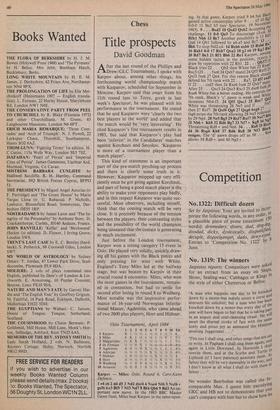No. 1319: The winners
Jaspistos reports.- Competitors were asked for an extract from an essay on 54.5' Shoes, Sealing-wax, Cabbages or Kings In the style of either Chesterton or Belloc.
'A man who happens one day to be knocked down by a motor-bus merely utters a curse and instructs his solicitor; but a man who has been knocked down by a motor-bus every daY of the year will have begun to feel that he is taking Tilt, in an august and soul-cleansing ritual. He await the diurnal stroke of fate with the sang lowly and pious joy as animated the Hindoos awaiting Juggernaut . .
This too I shall sing, and other songs that are yet to write. In Pagham I shall sing them again, and again in Little Dewstead. In Hornside I shall rewrite them, and at the Scythe and Turtle 111 Liphook (if I have patience) annotate them. AA1 Selsey they will be very damnably in the waY• and I don't know at all what I shall do with them at Selsey . .
No wonder Beerbohm was called the In- comparable Max. I quote him parodYIng GKC and HB not to demonstrate that You can't compare with him but to show how he
Could bottle the essence of a writer in less than 80 words. Not many of you were brave enough to have a go, none of you dared attempt Sealing-wax, and one or two of you slipped up on unlikely (I thought) puns. Peggy Sandars, Paul Griffin and Basil Ransome-Davies get Es for excellent ef- forts, the four winners below earn £12 each, and the bonus bottle of Blandy's 10-year- old Madeira (courtesy of Hedges & Butler Ltd) is awarded to Jonathan Fernside.
Is there any other, among earth's artefacts, that more ore exactly illustrates the importance of frustration and the futility of possession than the ship? I can think of no ship that, descried distantly from a headland or seen bustling self- !fliPortantly out of harbour, has not inspired me instantly with the desire to be aboard it. I can think of no ship that, once boarded, has not in- spired me with an equally fervent desire to be
..,, i
ashore again at the earliest possible opportunity. The initial attraction of a Mediterranean cruise is Only exceeded by the insupportable tedium of actually embarking on one. Yet the illusion per- sists even when we are in a position to see through ugh it. As we lean queasily over the rail, the 414 that passes us seems, lit overall, a vessel of enchantment, while ours is the very Ship of Fools. Only later do we learn that their engines Were more clangorous, their crew more
mutinous, their bunks more verminous even than our own. (Jonathan Fernside) One of our sadder and greyer modern poets has written of 'the smell of cabbages in alleyways' or something of the sort.. It is typical of this negative and despairing school that the worst, the least attractive, aspect of this humble vegetable should be taken as being of the essence.
Not even that rabid vegetarian, Mr Bernard Shaw, who may well know more about cabbage than I do, would perpetuate so pejorative a view. What I do know about cabbage, what any Chris- tian knows about cabbage for that matter, does indeed lead at once to the conclusion that the smell of cabbage, whether in an alleyway or out of an alleyway, pales into total insignificance beside the glory of the greenness of cabbage or the wonder of the taste of cabbage.
(John Sweetman) Cabbages, like all bad things, came to pro- minence with the Reformation. Rabelais roundly abuses them — and quite rightly too. The Ger- mans, of course, had always had a taste for them, pickling them and simmering them and cutting them up fine and small and sour and packing them away in beastly little jars for the nourishment of their whey-faced children in mid- winter. But among Christians cabbages were what you fed to pigs at Lammastide, or threw at greasy-bearded, bacon-shunning usurers all year round.
Alas, in France, since Freemasons and atheists have joined hands to pervert Danton's ideal republic, the cabbage is making a sly, shuffling entry into the menu. Chou tied together with fleur in one glorious vegetable, and sluiced down with torrents of Loire, I can tolerate, even recommend. Chou by itself I consign to perdi- tion. Hell undoubtedly crackles with roasting cabbages. Satan feeds on nothing else.
(Charles Mosley) (From The Tactics and Strategy of Shoe Manufacturers) At this point we may emphasise the way in which Oxford Street was a strategic accident, _but a tactical triumph. Strategically there was nothing to boast of on either side. Each of the two rival Companies, Lilley & Skinner and Freeman Hardy & Willis, under-estimated the advance of the other. That is, each thought the other was one mile further on than it really was, with the result that the two blundered into each other, to the surprise of both. 1 intend these observations to be for the general reader. My ex- perience is that for general readers in a technical subject very clear statement of first principles, even at the risk of repetition, is of advantage, the main lines of any conclusion being always simple and capable of being simply stated; further, I have found that an accumulation of detail hinders the comprehension of shoe history.
(D.B. Jenkinson)















































 Previous page
Previous page